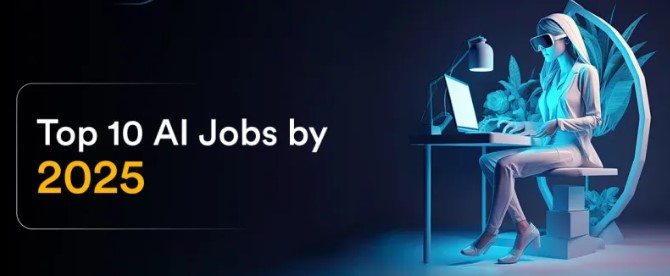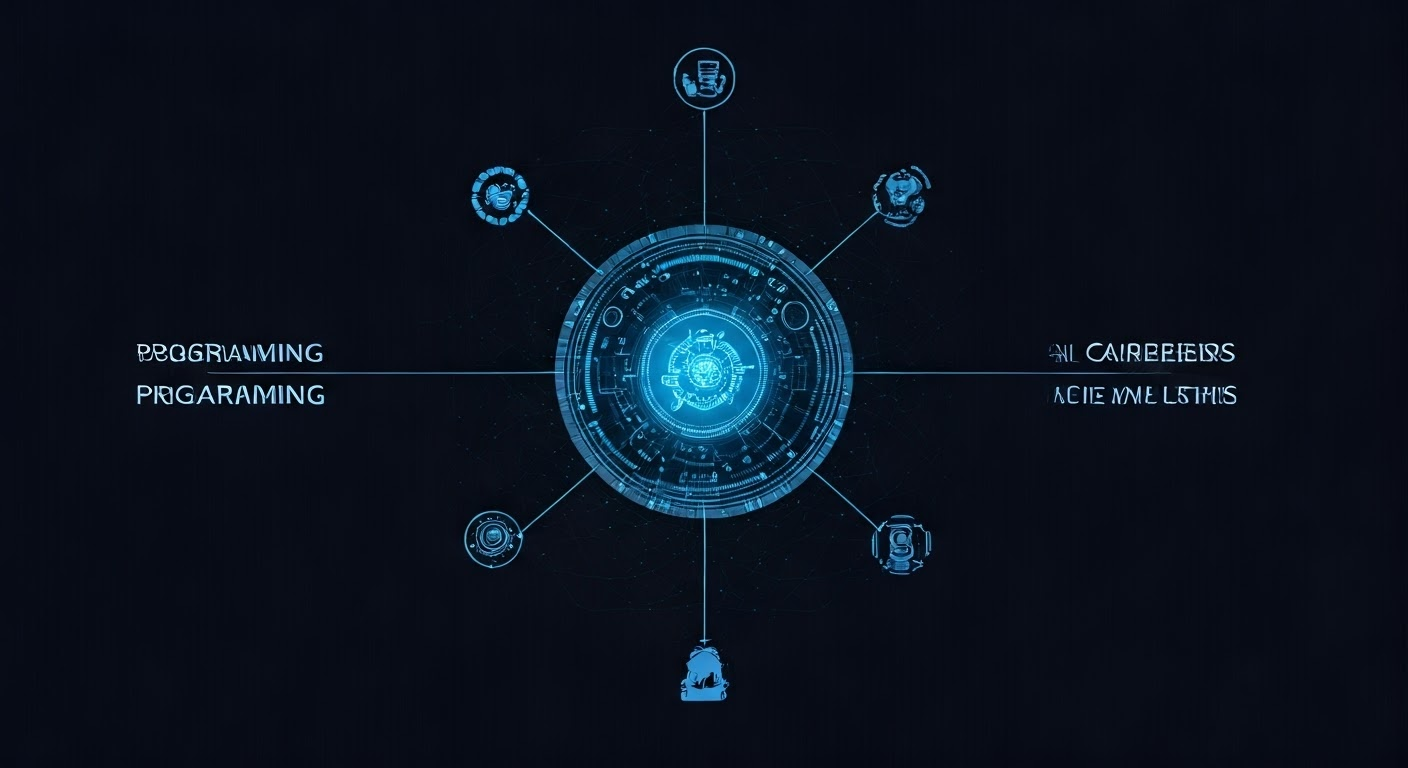
Future-Proof Your Career: AI Jobs 2025

Key Highlights
- The emergence of artificial intelligence (AI) is transforming the job market, leading to the creation of new job roles.
- By 2025, the AI industry is projected to generate millions of jobs globally, per the World Economic Forum.
- Essential skills for an AI career include programming, machine learning, data science, and a firm grasp of AI's ethical implications.
- Early adoption of continuous learning and practical experience through projects can give you an advantage in this evolving job market.
- Networking within the AI professional community can unlock potential opportunities and insights.
Introduction
Artificial intelligence (AI) is no longer a futuristic concept; it's actively shaping the future of work. As we look toward 2025, Labor market watchers told Business Insider that the job market is poised for a significant transformation, with AI playing a pivotal role. This shift presents a unique opportunity for professionals to engage with this evolving landscape and explore rewarding career paths in the world of AI.
Exploring AI Job Opportunities in 2025

The landscape of AI job opportunities in 2025 extends far beyond technical roles. While proficiency in AI technology is crucial, there's a burgeoning need for professionals who can bridge the gap between AI and various industries. This intersection of AI and diverse sectors creates a dynamic environment teeming with possibilities for aspiring AI professionals.
Whether you're passionate about healthcare, finance, or even the arts, AI integration is inevitable. Understanding the breadth of these opportunities will be paramount in navigating your career trajectory in the age of AI.
1. AI and Machine Learning Engineer
At the forefront of the AI revolution are AI, Machine Learning Engineers, and graphic designers. These professionals are the architects behind algorithms and AI technology solutions that power a multitude of applications, leading to new jobs across sectors. With expertise in machine learning, deep learning, and related fields, they develop AI models capable of analyzing data, making predictions, and automating complex tasks.
The demand for AI and Machine Learning Engineers is soaring, as businesses across various industries seek to integrate AI solutions into their operations. From optimizing logistics to personalizing customer experiences, their skills are highly sought after, while many trades still require significant manual labor.
Proficiency in programming languages like Python, coupled with a strong foundation in mathematics and statistics, is paramount for success in this role. As AI technology continues to advance, the need for skilled AI and Machine Learning Engineers will only intensify.
2. Robotics Scientist
Robotics Scientists are at the helm of a new industrial revolution, one driven by robotics and automation. They specialize in the design, development, and implementation of robots capable of performing a wide range of tasks. From autonomous vehicles, where human drivers are gradually being replaced, to advanced manufacturing systems, their work is transforming industries and creating new possibilities.
As businesses increasingly turn to automation to enhance efficiency and productivity, the role of a Robotics Scientist becomes increasingly vital. They combine expertise in mechanical engineering, computer science, and AI to create intelligent machines that can perceive, learn, and interact with their environment.
The work of Robotics Scientists goes beyond merely building robots; it's about solving real-world problems through innovation. Their ability to integrate complex systems and develop cutting-edge robotic solutions will continue to drive advancements in fields like healthcare, logistics, and manufacturing.
3. Data Analyst & Scientist
Data is the lifeblood of AI, and Data Analysts and Scientists are the experts who extract valuable insights from the vast oceans of information, also known as big data. They are skilled in data analysis techniques, statistical modeling, and machine learning algorithms, enabling them to uncover hidden patterns, predict market trends, and provide data-driven recommendations.
In today's data-centric world, their role is more critical than ever. Organizations across industries rely on Data Analysts and Scientists to make informed decisions, optimize operations, and gain a competitive edge.
From identifying customer behavior patterns to forecasting financial markets, their work is essential for organizations seeking to harness the power of data and make informed decisions in the age of AI.
4. AI Ethics Officer
As AI becomes increasingly integrated into our lives, so too do the growing demand for ethical implications of its use. This is where AI Ethics Officers come in, serving as the moral compass for organizations developing and deploying AI technologies. They possess a unique blend of technical understanding and ethical awareness, ensuring that AI is used responsibly and for the benefit of humanity.
The role of an AI Ethics Officer demands a deep understanding of AI ethics principles, such as fairness, transparency, and accountability. They work to mitigate bias in algorithms, promote responsible data use, and address potential societal impacts of AI systems.
With a focus on emotional intelligence and human values, AI Ethics Officers are crucial in building and maintaining trust in AI, ensuring that its development and implementation align with ethical considerations.
5. Natural Language Processing Specialist
Natural Language Processing (NLP) Specialists play a pivotal role in bridging the communication gap between humans and machines. They specialize in developing algorithms and models that enable computers to understand, interpret, and generate human language, revolutionizing customer service, content creation, and more.
From chatbots that provide instant customer support to AI-powered writing assistants and virtual assistants that generate human-quality content, the applications of NLP are vast and expanding rapidly. NLP Specialists are at the forefront of these advancements, using their skills to enhance communication, automate tasks, and create more intuitive user experiences.
As AI continues to evolve, NLP will remain a critical area of development, making the role of NLP Specialists essential in shaping how we interact with technology. Their expertise will be highly valuable in fields such as customer service, translation, and education, to name a few.
6. Cybersecurity Analyst
With the increasing sophistication of AI technology, the need to protect data and systems from cyber threats also grows. Cybersecurity Analysts specializing in AI are essential in safeguarding organizations from these evolving risks.
These professionals combine their knowledge of cybersecurity principles with expertise in AI and machine learning to detect, analyze, and respond to sophisticated cyberattacks. They develop and implement AI-powered security solutions that can anticipate threats, identify vulnerabilities, and protect sensitive information.
As organizations increasingly rely on AI and machine learning, the role of an AI-focused Cybersecurity Analyst will continue to be critical in ensuring the secure and responsible development and deployment of these transformative technologies.
7. AI Research Scientist
Pushing the boundaries of AI innovation are AI Research Scientists, who conduct extensive research and contribute to the development of AI technologies. They are at the forefront of exploring new frontiers in AI, pushing the limits of what's possible and shaping the future of the field.
Working at the cutting edge of AI, they delve into areas such as deep learning, reinforcement learning, and computer vision. Their research findings contribute to the advancement of AI and lead to the development of new and innovative applications.
A strong academic background in computer science, mathematics, or a related field is essential for this role. AI Research Scientists are driven by a passion for discovery and a desire to advance the state-of-the-art in artificial intelligence. Their work ensures that AI continues to evolve, leading to breakthroughs that benefit society and shape the future of technology.
8. Computer Vision Engineer
Computer Vision Engineers are giving machines the gift of sight, enabling them to "see" and interpret the world around us. These highly skilled professionals specialize in computer vision, a field of AI that allows computers to process and analyze visual information.
Their work is instrumental in developing applications such as facial recognition software, medical image analysis tools, and the sophisticated vision systems found in autonomous vehicles. Through algorithms and machine learning models, Computer Vision Engineers empower computers to understand images and videos, extracting valuable insights and enabling a wide range of groundbreaking technologies.
The demand for Computer Vision Engineers is on the rise, driven by the increasing adoption of computer vision across industries such as healthcare, security, and transportation.
9. AI Project Manager
AI Project Managers bring order to the complex world of AI initiatives, ensuring that projects are delivered on time, within budget, and to the required specifications. They possess a unique blend of project management expertise and a deep understanding of AI concepts and technologies.
Their role involves overseeing the entire project lifecycle, from defining project scope and objectives to managing resources, mitigating risks, and ensuring effective team coordination. They bridge the gap between technical teams and business stakeholders, facilitating communication and ensuring alignment between AI initiatives and overall business goals.
As organizations increasingly adopt AI, the demand for skilled AI Project Managers is rising. Their ability to navigate the complexities of AI project management is essential for organizations to successfully leverage AI and achieve a return on their investment.
10. AI Systems Architect
AI Systems Architects are the masterminds who design and build the underlying infrastructure that supports AI applications. They possess an in-depth understanding of system architecture, AI integration, and the latest advancements in AI technology.
Working closely with business leaders and technical teams, AI Systems Architects are responsible for defining the overall structure of AI systems, ensuring scalability, security, and seamless integration with existing infrastructure. They are involved in every stage of the process, from selecting the right hardware and software components to designing data storage and processing pipelines.
Their expertise ensures that AI systems are robust, reliable, and meet the specific requirements of the organization. As AI adoption continues to grow, the role of an AI Systems Architect will remain crucial in shaping the technological landscape of organizations across industries.
Skills Essential for a Career in AI

Breaking into the exciting world of AI requires a blend of technical proficiency and essential soft skills. While AI technology rapidly evolves, a strong foundation, including a human touch, in these areas will set you on a path for success. Whether you're passionate about programming, data analysis, or AI ethics, honing these skills will be paramount.
Building a well-rounded skill set that encompasses both the technical and human-centric aspects of AI will be crucial for thriving in this dynamic field.
Understanding of Programming Languages
Proficiency in programming languages is non-negotiable for aspiring AI professionals. AI development heavily relies on languages like Python, R, and Java. Understanding their syntax and capabilities allows you to write algorithms, build models, and manipulate data effectively.
The ability to code brings your generative ai tools and AI ideas to life. Whether you're developing an algorithm for sentiment analysis or building a deep-learning model for image recognition, programming is the backbone of these endeavors. Embrace the challenge of learning new skills and diving into the world of AI development through coding.
As you progress, exploring advanced concepts such as object-oriented programming and data structures will further enhance your capabilities and allow you to tackle more complex AI projects.
Proficiency in Machine Learning Algorithms
Machine learning sits at the heart of many AI solutions, making it an essential area of expertise for aspiring AI professionals. Understanding machine learning algorithms like regression, classification, and clustering, and knowing how to apply them to real-world problems is crucial.
These algorithms allow AI systems to learn patterns from data and make intelligent predictions or decisions. Whether it's predicting customer churn, identifying fraudulent transactions, or recommending products, machine learning algorithms are the driving force behind these intelligent actions.
The field of machine learning is constantly evolving, with new algorithms and techniques emerging all the time. Embracing lifelong learning and staying updated on the latest trends and advancements in this domain is essential for any AI professional.
Data Science and Analytics Skills
AI thrives on data, making a strong foundation in data science and analytics essential for success. The ability to work with big data, extract meaningful insights, and transform raw data into valuable information is crucial for building, training, and evaluating AI models.
Data science skills equip you with tools to explore, visualize, and manipulate data, uncovering hidden patterns and trends. From data cleaning and preprocessing to statistical analysis and feature engineering, mastering data science techniques is paramount for any AI professional.
As you advance, exploring advanced analytics techniques, such as predictive modeling and prescriptive analytics, will further enhance your capabilities and allow you to extract deeper insights from data.
Ethical and Social Implications of AI
AI is not merely about technical prowess; it's about developing and using AI technology responsibly. Understanding the ethical and social implications of AI is paramount for anyone entering this field. As AI becomes increasingly powerful, it's crucial to consider its potential impact on society.
This involves understanding concepts such as bias in algorithms, data privacy, and the potential displacement of jobs. Engaging in discussions, attending workshops, and keeping yourself informed about the social impact of AI are essential steps in becoming a responsible AI professional.
By advocating for responsible AI development and usage, you can contribute to ensuring that AI benefits humanity and addresses concerns related to fairness, transparency, and accountability.
How to Prepare for an AI-Driven Job Market

The job market is evolving at an unprecedented pace, driven by rapid advancements in AI technology. To thrive in this dynamic landscape, professionals need to adopt a proactive approach to learning and upskilling, acquiring the necessary skills to adapt to the changing demands of the AI-driven job market.
By embracing continuous learning, gaining practical experience, and networking with industry professionals, you can position yourself for success in the exciting world of AI.
Continuous Learning and Certification
In the rapidly evolving job market, resting on your laurels is not an option, especially in the dynamic field of AI, where new breakthroughs emerge frequently. Embrace a mindset of lifelong learning to stay ahead of the curve.
Pursue online courses, attend workshops, participate in webinars, and consider certifications to demonstrate your AI knowledge and skills. The more you learn, the better equipped you'll be to adapt to the latest advancements and seize new opportunities.
Actively updating your knowledge base ensures you remain competitive and relevant. Embrace challenges, be open to new ideas, and view lifelong learning as an exciting journey of continuous improvement.
Gaining Practical Experience Through Projects
Theoretical knowledge alone won't cut it in the world of AI. Employers value practical experience, so roll up your sleeves and get hands-on. Engage in project work that allows you to apply your AI skills to real-world applications.
Build a portfolio of AI projects demonstrating your ability to solve problems, develop algorithms, and work with data. This could involve anything from building a simple chatbot to creating a machine-learning model for image classification.
Practical experience not only enhances your technical abilities but also provides you with valuable insights into the challenges and rewards of working on real-world AI applications.
Networking with AI Professionals
Networking is invaluable in any field, and AI is no exception. Connect with other AI professionals, attend industry events, and join online communities to expand your network and knowledge base.
Building relationships with professionals already working in AI provides you with insights into industry trends, career paths, and potential job opportunities. Networking opens doors to mentorship opportunities, collaborations, and exposure to diverse perspectives within the field.
Engage in discussions, ask questions, and actively participate in the AI community to stay informed, build valuable connections, and expand your horizons.
KeywordSearch: SuperCharge Your Ad Audiences with AI
KeywordSearch has an AI Audience builder that helps you create the best ad audiences for YouTube & Google ads in seconds. In a just a few clicks, our AI algorithm analyzes your business, audience data, uncovers hidden patterns, and identifies the most relevant and high-performing audiences for your Google & YouTube Ad campaigns.
You can also use KeywordSearch to Discover the Best Keywords to rank your YouTube Videos, Websites with SEO & Even Discover Keywords for Google & YouTube Ads.
If you’re looking to SuperCharge Your Ad Audiences with AI - Sign up for KeywordSearch.com for a 5 Day Free Trial Today!
Conclusion
In wrapping up, the future of AI jobs in 2025 looks promising with diverse opportunities ranging from AI Engineers to AI Project Managers for the foreseeable future. To thrive in this evolving landscape, aspiring professionals must equip themselves with essential skills like programming knowledge, machine learning proficiency, and ethical considerations. Continuous learning, practical experience, and networking are crucial for success in the AI-driven job market. By staying abreast of industry trends and honing these skills, individuals can secure a rewarding career in the dynamic field of artificial intelligence. Start preparing today to embrace the exciting prospects that AI jobs in 2025 have to offer.
Frequently Asked Questions
What qualifications are needed for a career in AI?
A strong foundation in computer science, mathematics, or a related field is often the starting point for a career in AI. Essential skills include programming, machine learning, data analysis, and critical thinking along with a strong understanding of ethical considerations. Yet, the AI field values continuous learning and adaptability, encouraging professionals to constantly update their knowledge and skills.
How can beginners enter the AI field?
For beginners, starting with online courses, bootcamps, or pursuing relevant degrees can pave the way for entry-level positions. Focus on skill development in areas like programming and machine learning, and actively network with AI professionals to gain insights and connections.
